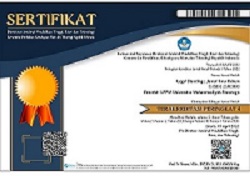Kedudukan Pengadilan Pajak dan Perbandingannya dengan Sengketa Tata Usaha Negara di Indonesia
DOI:
https://doi.org/10.24269/ls.v9i4.11726Abstrak
The Tax Court is a special judicial institution authorized to handle tax disputes in Indonesia. Its position is under the Supreme Court in terms of judicial technical guidance, but administratively, organizationally, and financially it is under the Ministry of Finance. This study aims to examine the position of the Tax Court in the Indonesian judicial system and to compare the mechanisms for resolving tax disputes with State Administrative (TUN) disputes. This study uses a normative legal method with a statutory regulatory approach and a conceptual approach. The results of the study indicate that the Tax Court is part of the state administrative court environment, but has specific procedures and authorities. The striking difference between tax disputes and TUN disputes lies in the resolution mechanism. Tax disputes are quasi-judicial in nature and require an objection procedure to the Director General of Taxes before they can be submitted to the Tax Court. In contrast, TUN disputes can be submitted directly to the State Administrative Court without going through the administrative objection stage. In addition, the decision of the Tax Court is final and binding, while the PTUN decision can still be pursued for further legal action. This difference reflects the characteristics of each dispute, and emphasizes the strategic position of the Tax Court in providing justice and legal certainty for taxpayers. This study is expected to contribute to strengthening the understanding of academics, legal practitioners, and the public regarding effective and targeted tax dispute resolution mechanisms.
Referensi
Alexander Hery, Pengantar Ilmu Hukum Pajak, Penerbit Yrama Widya, Bandung, 2021, hlm 6.
Dewi Kania S, dkk, Hukum Pajak, PT Remaja Rosdakarya, Bandung, 2021, hlm 207.
Ida Zuraida, Sengketa Pajak Dan Upaya Penyelesaiannya, Yogyakarta: Mirra Buana Media, 2021, hlm 16
Mardiasmo, Perpajakan, Penerbit Andi, Yogyakarta, 2008.
Mustfa Bachasan, Pokok-pokok Hukum Administrasi Negara, Penerbit Alumni, Bandung, 1979, hlm 114.
M. Yahya Harahap, Beberapa Tinjauan mengenaik Sistem Peradilan dan Penyelesaian Sengketa, PT Citra Aditya Bakti, Bandung, 1997.
Pardiat, Pemeriksaan Pajak Edisi Kedua, Mitra Wacana Media, Jakarta, 2008.
R. Brotodihardjo, Pengantar Ilmu Hukum Pajak, Penerbit Refika Aditama, Bandung, 2010, hlm 10.
Rochmat Soemitro, Asas dan Dasar Perpajakan Jilid 2, Penerbit Eresco, Bandung, 1991, hlm 14.
Erwiningsih, Winahyu, “Implementasi Penyelesaian Sengketa Pajak Pada Pengadilan Pajak Indonesiaâ€, Jurnal Justicia Sains, Vol 6(2), 2022, hlm 256.
Fitri Suciyani, “Kedudukan Pengadilan Pajak Dalam Sistem Peradilan Di Indonesiaâ€, Dharmasisya Jurnal Fakultas Hukum Indonesia, Vol 2(1), 2022, hlm 381.
Nabitatus Sa’adah, “Mekanisme Penyelesaian Sengketa Pajak dalam Sistem Peradilan di Indonesiaâ€, Adminitrative Law & Governance Journal, Vol 2(1), 2019, hlm 20.
Nabitatus Sa’adah & Kadek Cahya S, “Batasan Kewenangan Mengadili Sengketa Pajak Antara Pengadilan Pajak dan Pengadillan Tata Usaha Negaraâ€, Jurnal Masalah-Masalah Hukum, Vol 52(1), 2023, hlm 21.
Yanova, M. hendri, Komarudin, P., & Hadi, H. (2023). Metode Penelitian Hukum: Analisis Problematika Hukum Dengan Metode Penelitian Normatif Dan Empiris. Badamai Law Journal Magister Hukum Universitas Lambung Mangkurat, 8(2), 394–408. https://doi.org/10.32801/damai.v8i2.17423
Unduhan
Diterbitkan
Cara Mengutip
Terbitan
Bagian
Lisensi

Legal Standing : (Jurnal Ilmu Hukum) is licensed under a Lisensi Creative Commons Atribusi-BerbagiSerupa 4.0 Internasional.

.png)

